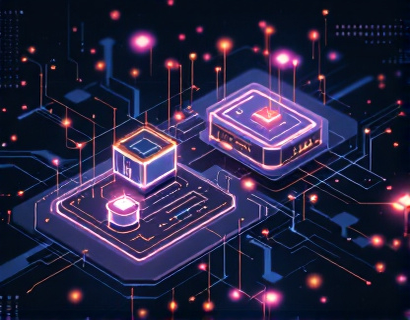Unlocking Blockchain's Potential: A Comprehensive Guide to Next-Gen Digital Currency and Token Creation Software
In the rapidly evolving landscape of digital finance, the potential of blockchain technology has become increasingly evident. Beyond its initial application in cryptocurrencies, blockchain offers a robust framework for creating and managing custom digital currencies and tokens. This guide delves into the intricacies of leveraging advanced software to unlock blockchain's full potential, focusing on customization, security, and scalability. Whether you are a blockchain enthusiast, a developer, or a business looking to enter the digital currency space, this comprehensive guide will provide valuable insights and practical tools to streamline your development process.
Understanding Blockchain and Digital Currencies
Blockchain technology is a decentralized ledger that records transactions across multiple computers in such a way that the registered transactions cannot be altered retroactively. This inherent transparency and immutability make blockchain an ideal foundation for digital currencies and tokens. Digital currencies, such as Bitcoin and Ethereum, are decentralized forms of money that operate independently of traditional financial institutions. Tokens, on the other hand, are digital assets that can represent various values, including currency, utility, or ownership rights, and are often built on existing blockchain platforms.
The creation of custom digital currencies and tokens involves several key steps, from designing the token's specifications to deploying it on a blockchain network. Advanced software tools play a crucial role in simplifying this process, offering features that cater to both novices and experienced developers. These tools provide a user-friendly interface for defining token parameters, writing smart contracts, and managing the entire lifecycle of the token.
Key Features of Advanced Token Creation Software
To effectively harness the power of blockchain for digital currency creation, it is essential to use software that offers a combination of customization, security, and scalability. Here are some of the key features to look for in token creation software:
- Customization Options: Advanced software should allow users to define unique token parameters such as total supply, distribution mechanisms, and smart contract functionalities. This flexibility ensures that the token meets specific project requirements and use cases.
- Robust Security: Security is paramount in blockchain applications. Reliable software must implement best practices for smart contract development, including thorough code audits, vulnerability assessments, and compliance with industry standards. This helps prevent potential security breaches and ensures the integrity of the token.
- Seamless Scalability: As the token gains traction, the underlying infrastructure must scale efficiently to handle increased transaction volumes. Software that supports scalable solutions, such as layer 2 protocols and sharding, ensures that the token can grow without performance bottlenecks.
- User-Friendly Interface: A intuitive interface simplifies the development process, making it accessible to users with varying levels of technical expertise. Drag-and-drop tools, pre-built templates, and step-by-step guides can significantly reduce the learning curve.
- Comprehensive Documentation and Support: Detailed documentation and responsive support are crucial for troubleshooting and optimizing the token development process. Comprehensive resources help users overcome challenges and make the most of the software's features.
Streamlining the Development Process
Advanced token creation software streamlines the development process in several ways, making it more efficient and less error-prone. Here’s how these tools can benefit developers and projects:
Firstly, pre-built templates and wizards guide users through the token creation process, reducing the need for extensive coding knowledge. This allows individuals without deep blockchain expertise to develop functional tokens. Secondly, integrated development environments (IDEs) provide a cohesive platform for writing, testing, and deploying smart contracts, enhancing productivity and reducing development time.
Moreover, these tools often include built-in testing frameworks and simulation environments. This enables developers to thoroughly test their tokens under various scenarios, identifying and fixing issues before deployment. Automated testing features save time and ensure higher quality outcomes.
Another significant advantage is the ability to manage token distribution and governance. Advanced software can handle complex distribution schemes, such as airdrops, staking rewards, and vesting schedules. Governance tokens can be integrated to allow token holders to participate in decision-making processes, fostering community involvement and trust.
Ensuring Security and Compliance
Security and compliance are critical considerations when creating digital currencies and tokens. Advanced software tools incorporate several measures to address these concerns:
First, smart contract audits are a fundamental part of the development process. Reputable software providers offer access to professional auditors who conduct thorough reviews of the code to identify and mitigate vulnerabilities. This step is essential for building trust and ensuring the reliability of the token.
Second, compliance with regulatory requirements is increasingly important in the crypto space. Advanced software can help projects navigate the complex regulatory landscape by providing guidelines and tools for implementing know-your-customer (KYC) and anti-money laundering (AML) protocols. This ensures that the token adheres to legal standards and avoids potential legal issues.
Additionally, secure storage and management of private keys are crucial. Software that supports hardware wallets and secure key management solutions helps protect user assets and prevents unauthorized access. This adds an extra layer of security to the token ecosystem.
Scalability and Performance Optimization
As digital currencies and tokens gain popularity, the underlying blockchain network must scale to handle growing demand. Advanced token creation software addresses scalability challenges through various mechanisms:
One approach is the integration of layer 2 solutions, such as state channels and sidechains, which offload transactions from the main blockchain, reducing congestion and lowering transaction fees. Another method is the implementation of sharding, which divides the blockchain into smaller, more manageable parts, each handling a subset of transactions.
Furthermore, software that supports interoperability protocols allows tokens to function across multiple blockchain networks, enhancing accessibility and use cases. This interoperability is crucial for building a robust and interconnected digital currency ecosystem.
Performance optimization is also a key focus. Advanced software optimizes smart contract execution, ensuring that transactions are processed quickly and efficiently. This not only improves user experience but also reduces the environmental impact of blockchain operations by minimizing energy consumption.
Use Cases and Applications
The applications of custom digital currencies and tokens are vast and varied, spanning multiple industries and use cases. Here are some notable examples:
In the realm of decentralized finance (DeFi), tokens play a central role in lending, borrowing, and yield farming. Custom tokens can be designed to offer specific financial instruments, such as stablecoins, which maintain a stable value relative to traditional currencies, reducing volatility.
In the gaming industry, tokens can represent in-game assets, providing players with tangible value and incentivizing engagement. These tokens can be traded, sold, or used to unlock exclusive content, creating a new economic model within games.
Supply chain management is another area where tokens can add significant value. By tokenizing goods and transactions, companies can enhance transparency, traceability, and efficiency. This is particularly useful in industries like logistics, agriculture, and manufacturing, where tracking the movement of goods is critical.
Lastly, utility tokens can be used to access services or products from various platforms, acting as a form of digital cash within a specific ecosystem. For instance, a token could grant access to a network of decentralized applications (dApps) or provide discounts at partner businesses.
Getting Started with Token Creation
For those ready to embark on the journey of creating their own digital currency or token, here are some steps to follow:
First, define the purpose and use case of your token. Determine what problem it solves and how it will add value to its users. This clarity will guide the design and development process.
Next, choose a blockchain platform that aligns with your project goals. Popular options include Ethereum, Binance Smart Chain, and Solana, each with its own strengths and considerations.
Utilize advanced token creation software to design your token. Define parameters such as token economy, distribution model, and smart contract logic. Take advantage of pre-built templates and guided workflows to simplify the process.
Once the token is designed, proceed to develop and test the smart contracts. Use the software’s testing tools to ensure everything functions as intended. Conduct thorough security audits to identify and address any vulnerabilities.
After successful testing, deploy the token on the chosen blockchain network. Follow best practices for launching, including marketing the token and engaging with the community. Monitor the token’s performance and gather feedback to make iterative improvements.
Finally, stay informed about the evolving landscape of blockchain and digital finance. Continuous learning and adaptation are key to staying ahead and maximizing the potential of your token.
By following these steps and leveraging advanced token creation software, you can unlock the full potential of blockchain technology and contribute to the growth of the digital currency ecosystem.










































